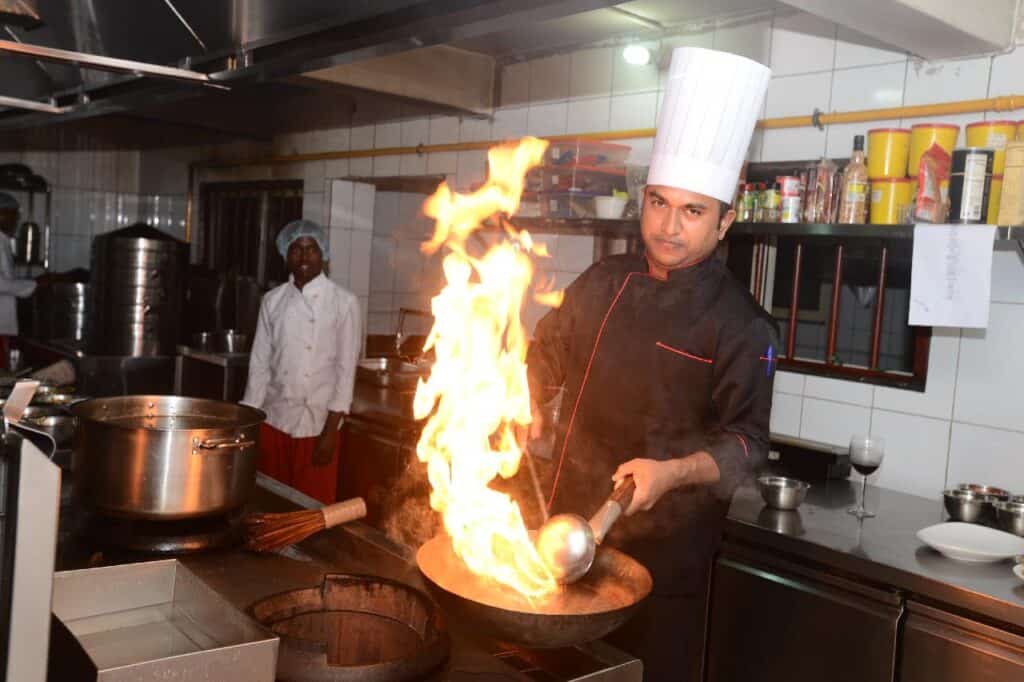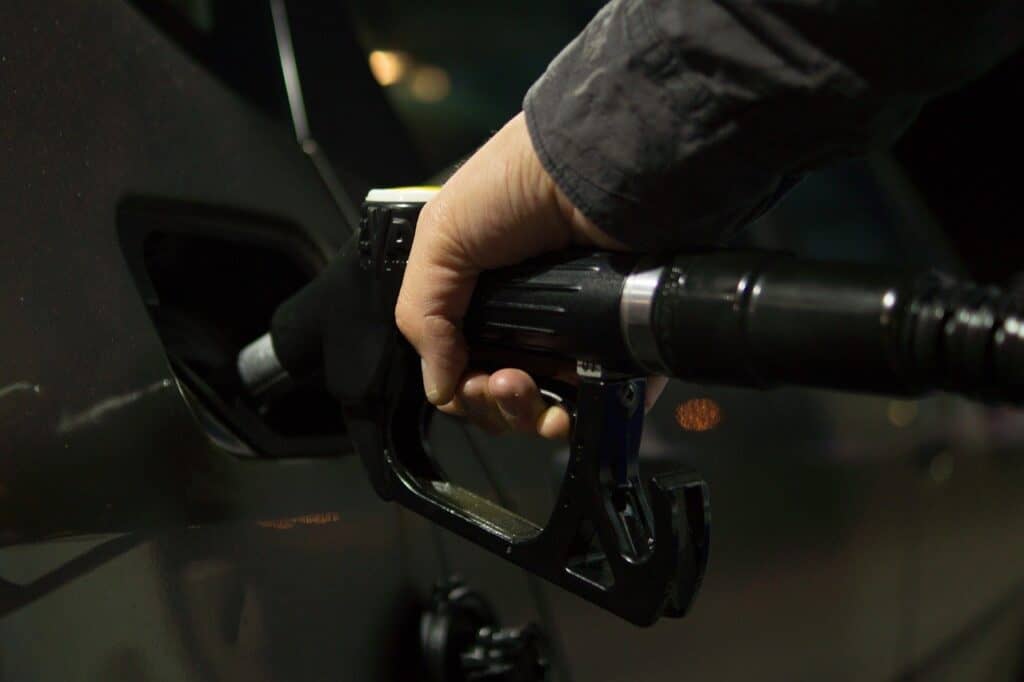Grease can be a confusing topic when it comes to how it interacts with fire. This is, of course, because there’s no such thing as “grease” but rather many different substances that produce a chemical state which we think of as “grease”. Automotive grease, for example, has very different properties from bacon grease.
In general, most types of grease will catch fire fairly easily, burn persistently, and can be difficult to extinguish. These can all depend on the type of grease, as auto grease is not the same as grease found in the kitchen.
You don’t want to accidentally start a fire, so being cautious is always the best strategy. Here is what you need to know.
Your # 1 priority is keeping your family safe. As a firefighter, I recommend everyone has updated smoke detectors that don’t require battery changes, like these ones from Kidde, a fire extinguisher, like this one from Amerex, and a fire escape ladder if you have bedrooms above the first floor, I recommend this one from Hausse.
Also read: What Makes Something Flammable?
What Is Grease?

There are two main types of grease.
There is the grease which is produced as a lubricant and is made of mineral or synthetic products, and it consists of liquid plus a thickening agent.
It’s used throughout industry because the thick consistency helps grease to seal any leaks in pipes and prevent contaminants from entering.
There is also the kind of grease, which is a residue from cooking fats, it’s produced by anything from butter to bacon.
It can build up on ovens or pans if not properly cleaned and in some cultures, grease can be considered a culinary delicacy in its own right.
The Polish dish, smalec, for example, consists of congealed lard grease and bacon and is spread on bread in a similar fashion to butter.
Why Is It Flammable?
Not all greases are flammable, and, in fact, industrial lubricants are not flammable.
It’s also fair to say that the majority of cooking greases are not flammable by the strictest definition either, but they are easily combustible which means they burn at temperatures above the definition of flammable, but which are still easily encountered in a kitchen.
What Type Of Fire Is A Grease Fire?
A cooking grease fire is officially classified as a Class B or Class K fire and you need to be sure to extinguish a Class B fire with a Class K fire extinguisher. Like this one.
Do not use water to put out a grease fire!
Also read: Is Tar Flammable?
Why Is Grease Non-Flammable?
Most lubricating greases are not flammable because they don’t burn at the temperatures considered to make a substance flammable.
Unlike cooking greases, the majority of lubricating greases don’t burn particularly easily, and they aren’t considered to be a fire hazard when working with them.
That’s not to say that they won’t combust at all though and it’s important to take basic safety precautions when working with lubricating greases.
Does Lubricating Grease Burn?
Yes, lubricating grease burns as a petroleum byproduct, once you apply enough heat and oxygen it will burn and because of the thickening agents used, it won’t burn particularly cleanly, either.
It is very important to consult the material data safety sheet when working with lubricating grease to determine any fire precautions that you need to take.
Because there is no standard formula for this kind of grease, each type may have very different properties to the last and the only way to be certain of this is to read the datasheet supplied.
If you have lubricating grease without a material data safety sheet, you should contact the manufacturer to get one or check the manufacturer’s website to see if they have one available for download (most will do).
Is Butter Flammable?
Butter is not, technically, flammable as it ignites over the 199.4 degrees Fahrenheit mark, but it can become flammable if it is melted and then sprayed as a mist.
This is the equivalent of making dust out of non-flammable solids and it hugely increases the available surface area to the volume of butter available.
So, it’s important not to spray butter around naked flames or electrical sparks.
Even when butter is not in mist form, however, it will burn fairly easily and, in fact, it’s a popular choice for making “emergency candles” within school projects and in real life when the lights go out and you’re stuck without candles.
Can Bacon Grease Start A Fire?
Bacon grease is made by melting the fat on bacon and then allowing it to congeal.
Most of the time, it’s not a problem at all but if you run a sloppy kitchen in which frying pans are not regularly cleaned then bacon grease could start a fire.
You see the grease will build up on the outside of the pan when it’s being stored and when the pan is placed into a flame, the grease melts, starts to smoke, and then catches fire (it’s not flammable but it is combustible).
If the pan is full of bacon fat at this point, it could potentially catch fire from the flames on the outside of the pan.
Fortunately, this kind of fire should be easy to extinguish, switch the gas off and cover the pan with a lid or a fire blanket.
There shouldn’t be enough bacon grease in any pan for the fire to get out of control.
What Causes An Oven Grease Fire?
Can a dirty oven cause a fire? Grease doesn’t have to come from a single product to be dangerous. In fact, over time, as you cook beef, pork, chicken, melt butter, etc. in your oven they can all leave a fat coating (a sort of generic kitchen grease) on the oven.
If you have a gas oven this grease will melt when you start cooking and could then smoke and catch fire easily due to the naked flames inside.
It might also be possible for the grease to reach its autoignition temperature in an electric oven, that is, it will catch fire without any flame present, though this is likely to be a more rare occurrence.
Also read: Will a Fire Extinguisher Ruin an Oven?
How Hot Can A Grease Fire Get?
Grease fires in the kitchen typically ignite at around 450-500 degrees Fahrenheit.
Industrial lubricants may burn over a much wider range of temperatures.
Can You Put Out A Grease Fire With Water?
Should you throw water on a grease fire? No!
If you want to spread a grease fire around rather than extinguishing it then throwing water on it is a great idea but it won’t extinguish the fire.
Why not?
Well, grease is simply oil.
And as every schoolchild chemist knows “oil and water don’t mix”.
So, when you spray water on a grease fire, it emulsifies the grease (turns it into little droplets) which spray everywhere and as these grease droplets are burning, the fire spreads with them.
And worse, any grease that wasn’t burning?
It will burn much more easily as tiny droplets than as a puddle of grease.
Also read: What Type Of Fire Can Be Put Out Safely With Water?
Can Flour Put Out A Grease Fire?
Not only does flour not extinguish a grease fire but the fine dust particles in flour are both flammable and an explosion hazard.
Under no circumstance should you put fire on a grease fire or any other kind of fire, you will be risking your life and potentially the lives of everyone around you too.
Does Sugar Put Out These Fires?
No, sugar doesn’t put out fires.
Ordinary sugar will melt and caramelize in a grease fire which presents a real risk of burns.
Worse, if the sugar is powdered, just like the flour in our last example, it is both flammable and an explosion hazard.
Also read: Is Sugar Flammable or Explosive? (Powdered Sugar)
How Do You Extinguish A Grease Fire?
To extinguish a grease fire you should first make sure that any heat source (gas or electric) has been switched off.
If the fire is small, you can smother it with a fire blanket and if you need to use an extinguisher on it, you should always use a type K fire extinguisher. Here is the Class K extinguisher I recommend for your kitchen.
How To Prevent These Fires?
The good news is that keeping grease fires to a minimum is easy.
For kitchen grease:
- Keep the kitchen clean and don’t allow grease to build up
- Always keep an eye on pans or pots on the stove or in the oven
- Keep the grease at the recommended temperature don’t let it smoke
- Slowly heat your oil and pans
- When adding food to hot oil, do it gently to prevent splashing
- Have a fire blanket, a fire extinguisher and a pot lid to hand to tackle fires before they get out of hand
Sources
1, 2, 3, 4, 5, 6, 7, 8, 9, 10, 11, 12, 13, 14, 15
Related Articles
Are All Oils Flammable? [Cooking, Motor, Mineral, Essential]

